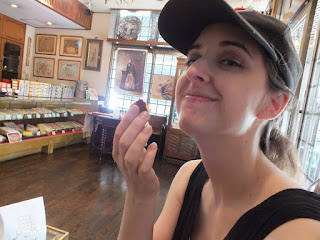(Note for email readers: this is a video; you have to click through to the blog to view).
If you can't see the video, here's how it goes. A volleyball point is scored, and in response, the team claps and chants out an organized cheer in a weird chirpy voice while jogging in a circle and doing a fist pump. It is the single most annoying thing I've ever seen at a sporting event, and I've seen seen both the Harvard and Princeton University marching bands. Just rewatching this video has stressed me out so much I need to take a break.
 What? Haven't you ever seen a baby beer before?
What? Haven't you ever seen a baby beer before? Now I'm more relaxed. Back to the topic.
Now I'm more relaxed. Back to the topic.So to emphasize, they do this every time they score a point. You play best-of-five games to 25 points each, so I was subjected to this charming chirp circle at least seventy-five times. With the pace of volleyball you can get two or three per minute. It was like watching a child cult ritual on a scratched and skipping DVD.
And it's even more aggravating when you remember that in volleyball, you score a point when you do something right, but you also score a point when the other team screws up - and they dance regardless of which process got them the point. So a girl on our team who's been practicing really hard all fall gives her best serve, but it doesn't go over. What does she have to look forward to? The opposing team doing the old clap, cheer, fist-pump-circle-dance to celebrate and call attention to her failure. This is not just annoying, it's the video that should show up in the thesaurus under "sportsmanship: antonyms." The first time you did this in the U.S., the referee would give you a warning. The second time, your whole team would probably be thrown out.
And yet I talked with one of our Japanese teachers, and she said this was "normal Japanese volleyball." It is apparently coached and expected from the players, at least for middle school girls. I can't confirm this. It didn't happen at the boys' game I went to last year, and I saw no sign of it in some Youtube videos - but those are international matches, so maybe there are specific rules on celebration.
In any case, the Japanese have a reputation for politeness and hospitality. This is the country where they bow to the referee, coaches, and opposing fans after the game. So I wonder if anybody on that team realized how unsportsmanlike this prancy routine appears to a Western audience. (Well, at least to two of us - one of my students was so aggravated by the proceedings that he actually had to leave the gym). Would they stop if they knew?
All I can tell you is if I show up at another game and this starts happening again, one baby beer won't cut it. I'm going to need a whole six pack.
 Even if it does cost $6.
Even if it does cost $6.



